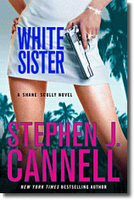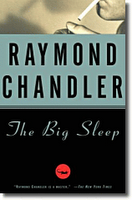 I usually like to see literary references pop up in stories: they remind me of good stories I've read (or, more likely, I'd like to read), and they show that the author regards himself as part of the continuous history of storytelling.
I usually like to see literary references pop up in stories: they remind me of good stories I've read (or, more likely, I'd like to read), and they show that the author regards himself as part of the continuous history of storytelling. I caught a few cool nods to other writers in Michael Connelly's new Harry Bosch novel, Echo Park; I'll bet I missed some, too.
Literary echo #1: On page 10 a famous poet is invoked to establish that while Harry Bosch isn't terribly literary, he can be a savvy interrogator. He and his partner are interviewing the landlord (Mr. "Kay") of a property where a murder clue has turned up.
"She went missing ten days ago," Bosch said. "That would have been Tuesday the ninth. You remember anything from back then? Anything unusual around here?"As far as I can tell, there is no link to Browning in the story. Browning did refer to William Johnson Fox as his "literary father" and there is a character in Echo Park whose name and aliases play on a fox motif, but those feel like a coincidences.
Kay shook his head.
"I wasn't here. I was on vacation in Italy."
Bosch smiled.
"I love Italy. Where'd you go?"
Kay's face brightened.
"I went up to Lake Como and then over to a small hill town called Asolo. It's where Robert Browning lived."
Bosch nodded like he knew the places and knew who Robert Browning was.
Connelly of course has written a book called The Poet. I don't recall if there are any Robert Browning overtones to it.
Literary echo #2: On page 51 Bosch is reading files in his case and reflects on the slogan printed on his coffee mug.
His mug had come from a famous writer and television producer named Stephen Cannell who had spent time with the OU Unit while researching a project. Printed on the side of the mug was Cannell's favorite piece of writing advice. It said What's the bad guy up to? Bosch liked it because he thought it was a good question for a real detective to always be considering as well.Cannell is a prolific writer and producer in real life; you may not have read his books but I'll bet you know some of his shows.
What's the Connelly-Cannell connection? The answer popped up when Book Help Web interviewed Connelly about Echo Park:
Book Help Web: In Echo Park, your detective Harry Bosch and his partner Kiz Rider both have coffee cups with the motto "What's the bad guy up to?" given to them by a visiting writer. Is this advice that you follow when writing? Do you keep a hidden timeline or background of what the bad guy is doing throughout the story?Literary echo #3: Page 168 finds Bosch and his colleagues at a secluded wooded site where the confessed killer they have in custody has led them to a body he says he buried.
Michael Connelly: It was advice from Stephen Cannell, who writes good books and TV shows. I heard that he had such a motto hanging in his office. So I asked if I could adopt it for this story. It['s] one of those connections between the art of writing and the art of detective work. I keep in mind the lives of characters off the page. This would include the bad guy. But I don't keep any sort of timeline or outline written down. I keep it all in my head. I should say I try to.
"We're here, Detective. You've finally found Marie."Bosch doesn't know who Waits has been reading but we do: Raymond Chandler. Chandler wrote:
"Where?"
Wait's smile broadened.
"You're standing on her."
Bosch abruptly stepped back a pace and Waits laughed.
"Don't worry, Detective Bosch, I don't think she minds. What was it the great man wrote about sleeping the big sleep? About not caring about the nastiness of how you died or where you fell?"
Bosch looked at him for a long moment, wondering about the literary airs of the window washer. Waits seemed to read him.
"I've been in jail since May, Detective. I've done a lot of reading."
"What did it matter where you lay once you were dead? In a dirty sump or in a marble tower on top of a high hill. You were dead, you were sleeping the big sleep, you were not bothered by things like that. Oil and water were the same as wind and air to you. You just slept the big sleep, not caring about the nastiness of how you died or where you fell. Me, I was part of the nastiness now."It's no surprise that Connelly would invoke Chandler. From an interview in 2005 with Connelly:
What was the book that most influenced your life or your career as a writer -- and why?Literary echo #4: On page 211 Bosch is on the phone with a reporter with whom he has traded information in past. He wants the unlisted telephone number of a politician who has slimed Bosch in the papers. The reporter doesn't want to give up the number and risk getting caught.
The Long Goodbye by Raymond Chandler. I read it in college and immediately subscribed to the idea of the crime novel as art. The book's evocation of Los Angeles and the social commentary on the city inspired me to become a writer.
Bosch quickly grabbed the Daily News, which was folded to the page with the political fallout story. He read the byline.It works: Harry gets the number.
"Okay, well maybe Sarah Weinman or Duane Swierczynski will feel comfortable giving it to me. They might want to have an IOU from somebody who's in the middle of this thing."
Sarah Weinman and Duane Swierczynski don't cover crime in L.A. for the Daily News, but they're real persons who are up to their ears in crime elsewhere.

In fact, I learned from Swierczynski's blog that Connelly's sentimental favorite novel is The Last Coyote, which reminded me of a passing comment Bosch makes when someone cautions him about visiting the aforementioned wooded crime scene alone. You could twist an ankle and be stuck out there all night with the coyotes, he's told. That's OK, Harry says, I've got my phone...and I like the coyotes.
--Marshal Zeringue








